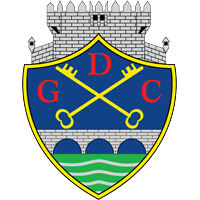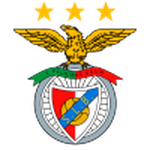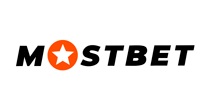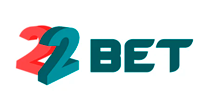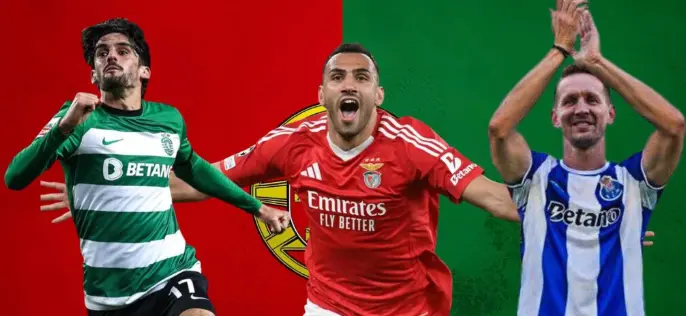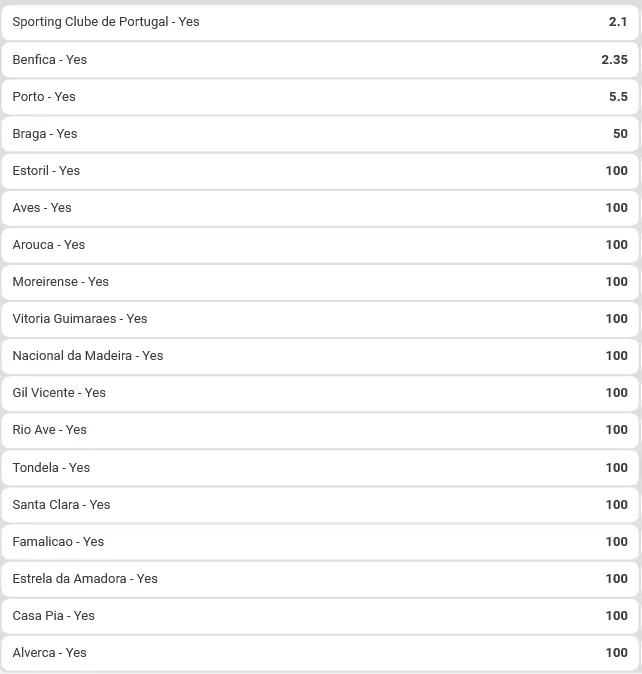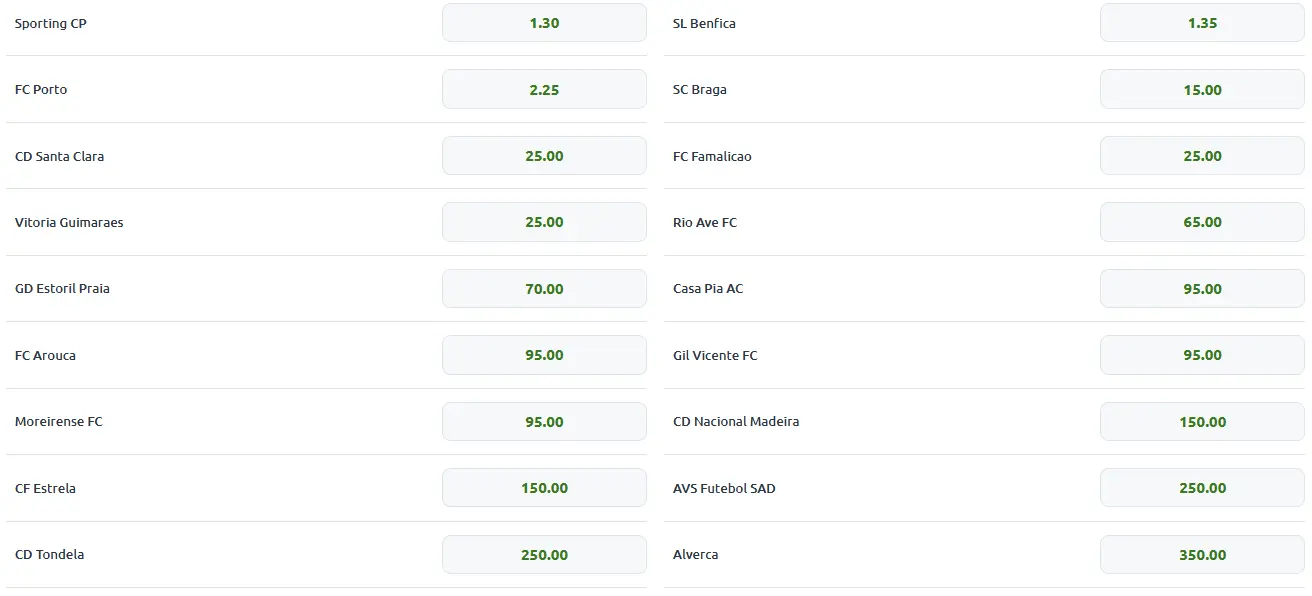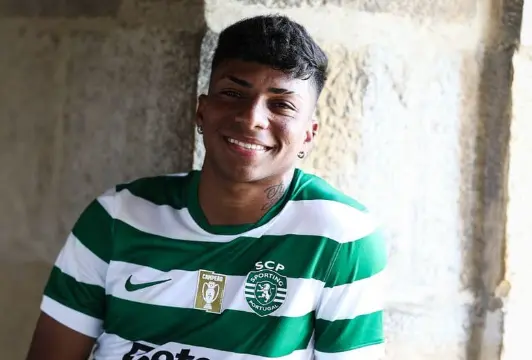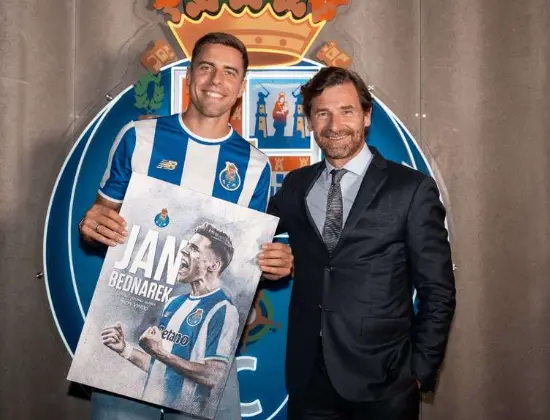
Predictions for Portuguese Liga Portugal football 2025-26
The Portuguese Primeira Liga approaches the 2025-26 campaign with compelling uncertainty regarding the championship competition. The coefficients indicate authentic balance between the Lisbon pair, establishing favorable circumstances for compelling title pursuit and substantial wagering possibilities.
🎁 120% first deposit bonus up to 400 USD
- Site: 1xbet.com
-
License: Curaçao
-
Customer service:
-
Promo: -
-
Minimum deposit: 1$
-
Minimum withdrawal: 1$
- iOS:
- Android:
Advantages of the bookmaker
- Licensed by Curaçao Gaming Control Board
- Partnerships with major sports organizations
- 120% bonus on deposit up to 400 USD
- Over 40 sports available for betting including esports
🎁 First deposit bonus €10,000 + 400 RG + 150 FB
- Site: mostbet.com
-
License: Curaçao
-
Customer service:
-
Promo: -
-
Minimum deposit: 1€
-
Minimum withdrawal: 1€
- iOS:
- Android:
Advantages of the bookmaker
- Licensed in Curaçao and established in 2009 under StarBet N.V.
- Four different registration methods (email, phone, social media, one-click)
- Comprehensive sports coverage with live betting and real-time odds
- 24/7 customer support with multiple contact channels
⚽ 100% bonus up to 122 EUR
🎰 100% bonus up to 300 EUR
- Site: 22bet.com
-
License: Curaçao
-
Customer service:
-
Promo: -
-
Minimum deposit: 1€
-
Minimum withdrawal: 1€
- iOS:
- Android:
Advantages of the bookmaker
- Licensed in Curaçao (license number 8048/JAZ2017-067)
- Over 1500 football betting markets available
- Welcome bonus 100% up to 122 EUR with 5x wagering requirement
- Site: 1win.com
-
License: Curaçao
-
Customer service:
-
Promo: -
-
Minimum deposit: 1$
-
Minimum withdrawal: 1$
- iOS:
- Android:
Advantages of the bookmaker
- Official partnerships with major sports organizations
- Welcome bonus up to 500% on first four deposits
- Over 40 sports available for betting plus extensive casino games
- 24/7 customer support with multiple communication channels
Leading Contenders for the 2025-26 Portuguese Competition
The framework of frontrunners in the Portuguese competition reflects the traditional structure of national football, controlled by the “Big Three,” yet with distinctive equilibrium within the elite category.

Portuguese Primeira Liga 2025-26
Sporting Clube de Portugal (2.1) occupies the leading coefficient position due to its approach of consistent growth and continuation in its tactical model. The Green Lions have established a maintainable framework that does not depend on singular standout performers but relies on collective proficiency and tactical organization. The central element in Sporting’s leadership position involves its capacity to merge the cultivation of academy-developed prospects with intelligent acquisitions in the transfer market. This framework provides both fiscal stability and athletic competitiveness.
Benfica (2.35) remains in close proximity, rendering the championship competition wide open. The Red Eagles concentrate on revitalizing their roster and allocating resources to developing prospects to guarantee long-term control. Benfica’s approach depends on one of Europe’s premier youth development systems, paired with selective acquisitions of internationally recognized performers. This methodology could produce results this campaign if the young prospects swiftly adjust to elite-level requirements.
Porto (5.5) occupies a distinctly different coefficient category but possesses a record of generating unexpected outcomes at critical junctures. The Dragons demonstrate traditional strength in psychological confrontations against the Lisbon powerhouses. Porto’s philosophy centers on tactical organization and complete commitment from every squad member. With fewer financial resources than their adversaries, they offset this through collective determination and the capacity to discover unexpected tactical approaches.
Braga (50) exemplifies the fourth power in Portuguese football, yet the separation from the elite proves substantial. The Minotaurs possess capability for occasional notable achievements but present no systematic danger to the Big Three.
The remaining competition participants hold coefficients of 100, indicating their function in the tournament—pursuing survival and attempting to generate local unexpected results against more prominent adversaries.
|
Team |
1xBet/22Bet/MelBet |
|---|
|
Sporting Clube de Portugal |
2.1 |
|
Benfica |
2.35 |
|
Porto |
5.5 |
|
SC Braga |
50 |
|
Estoril |
100 |
|
Aves |
100 |
|
Arouca |
100 |
|
Moreirense |
100 |
|
Vitoria Guimaraes |
100 |
|
Nacional da Madeira |
100 |
|
Gil Vicente |
100 |
|
Rio Ave |
100 |
|
Tondela |
100 |
|
Santa Clara |
100 |
|
Famalicao |
100 |
|
Estrela da Amadora |
100 |
|
Casa Pia |
100 |
|
Alverca |
100 |

Leading Contenders for the 2025-26 Portuguese Competition
Wagering on Top-2 in the 2025-26 Portuguese Competition
The top-two market in the Portuguese competition presents a distinctive circumstance—a genuine battle among three organizations for two Champions League positions. This competition generates notable opportunities for extended wagering approaches.
Sporting (1.30) maintains a minor advantage in coefficients due to the reliability of their results in recent campaigns. The Green Lions exhibit the consistency vital for obtaining a position in European tournaments.
Benfica (1.35) stands nearly equivalent as a top-two aspirant, reflecting the caliber of their roster and the capability of their young performers. The Red Eagles possess adequate squad depth to compete across multiple competitions.
The crucial uncertainty centers on the third top-two challenger. Porto (2.25) maintains a realistic prospect of replacing one of the Lisbon powerhouses, rendering each direct confrontation between these organizations decisive for the conclusive standings.
Braga (15.00) holds coefficients 6-7 times elevated compared to Porto, signaling a qualitative separation between the Big Three and the remaining competition. The Minotaurs can target third position at their peak achievement.
Secondary-tier organizations like Santa Clara, Vitoria Guimaraes, and Famalicao (all at 25.00) could theoretically experience a breakthrough campaign, yet their probability of concluding in the top-two remains purely speculative.
|
Team |
Odds |
|---|
|
Sporting CP |
1.30 |
|
SL Benfica |
1.35 |
|
FC Porto |
2.25 |
|
SC Braga |
15.00 |
|
CD Santa Clara |
25.00 |
|
Vitoria Guimaraes |
25.00 |
|
FC Famalicao |
25.00 |
|
Rio Ave FC |
65.00 |
|
CD Estoril Praia |
70.00 |
|
Casa Pia AC |
95.00 |
|
FC Arouca |
95.00 |
|
Gil Vicente FC |
95.00 |
|
Moreirense FC |
95.00 |
|
CD Nacional Madeira |
150.00 |
|
CF Estrela |
150.00 |
|
CD Tondela |
250.00 |
|
AVS Futebol SAD |
250.00 |
|
Alverca |
350.00 |

Wagering on Top-2
Wagering on the 2025-26 Portuguese Cup
Sporting (2.50) stands as the frontrunner in the cup tournament, which proves logical considering their championship classification and roster depth. The Green Lions approach the national cup seriously as an occasion to secure an additional trophy.
Benfica (3.50) receives recognition as the primary challenger to Sporting in the cup pursuit. The Red Eagles possess extensive tradition in this tournament and frequently utilize cup fixtures to incorporate young prospects into the primary squad.
Porto (4.75) may present the strongest value among the frontrunners. In a cup structure, psychological elements assume significant influence, and the Dragons demonstrate traditional strength in decisive fixtures against higher-rated adversaries.
Braga (8.00) consistently advances to the later phases of the cup and possesses capability to generate difficulties for any of the powerhouses in a single-match scenario. The Minotaurs’ challenger mentality can prove advantageous.
|
Team |
Odds |
|---|
|
Sporting CP |
2.50 |
|
SL Benfica |
3.50 |
|
FC Porto |
4.75 |
|
SC Braga |
8.00 |
|
Vitoria Guimaraes |
15.00 |
|
CD Santa Clara |
40.00 |
|
CD Tondela |
40.00 |
|
Alverca |
50.00 |

Wagering on the 2025-26 Portuguese Cup
Summer Transfer Activity of Portuguese Organizations
The 2025 transfer period in Portuguese football featured strategic planning from all members of the Big Three. Each organization selected its own pathway to constructing a competitive roster, generating a distinctive combination of approaches.
Sporting: International Development Approach
Sporting executed an ambitious international recruitment initiative, securing prospects from various football cultures. The Lisbon Lions displayed their capability to compete in the global transfer market.
Luis Suárez emerged as the central acquisition to stabilize the midfield. The experienced midfielder contributes an international standard of performance and leadership attributes critical to their championship objectives. Georgi Kochorashvili reinforced the defensive line with European background, while Rui Silva contributed versatility to attacking frameworks. Alisson Santos exemplifies the South American tradition of creativity in midfield.
Developing acquisitions João Virgínia and Diogo Trivaldos indicate long-term planning and confidence in cultivating young prospects.
Notable departures comprise Viktor Gyökeres, Dário Essugo, Marcus Edwards, Franco Israel, and Vladan Kovačević. The exit of Gyökeres, the Swedish marksman, proved particularly damaging, as he functioned as a central component in Sporting’s offensive framework.
The fiscal balance remained favorable through sales, permitting reinvestment in quality reinforcements without jeopardizing financial stability.

Alisson Santos Sporting
Benfica: Generational Transformation
Benfica selected a strategy of substantial roster revitalization, investing in performers who will shape the organization’s identity for the coming decade.
Richard Rios became a central acquisition for the creative midfield area, contributing Colombian technique and a contemporary comprehension of positional tactics. Amar Dedić reinforced the right channel of the defense with Balkan dependability. Samuel Dahl and Rafa Obrador exemplify investments in the squad’s foundation—defensive stability, which constitutes the backbone of any serious project.
Among those departing the Eagles’ organization, the departure of Ángel Di María proves notable—the Argentine master represented a symbol of creativity and experience. Álvaro Carreras, Arthur Cabral, Casper Tengstedt, João Mário, Sevalino Menze, and Martim Neto likewise departed.
The revitalization strategy may generate long-term benefits, yet short-term adjustment dangers receive reflection in the bookmakers’ coefficients.
Porto: Tactical Development
Porto executed a comprehensive roster modernization, combining the acquisition of established professionals with investments in developing performers.
Viktor Frihöldt contributed Scandinavian work discipline to the midfield, while Gabri Veiga added Spanish technique to attacking frameworks. Alberto Costa and Nehuén Pérez reinforced the defense with international background. Borja Sainz and Jan Bedranek established quality competition in midfield, while Dominik Pryč and João Costa exemplify long-term investments.
Notable departures comprise Francisco Conceição, Otávio, João Mário, Gonçalo Borges, Fran Navarro, and Iván Marcano. The exits of Conceição and Otávio particularly diminish the attacking capability.
The requirement to incorporate numerous additions while surrendering experienced leaders clarifies Porto’s relatively elevated coefficients.

Jan Bednarek Porto
Braga: Pragmatic Consistency
Braga operated within its fiscal parameters, concentrating on focused reinforcements without revolutionary modifications.
Pau Víctor contributed Spanish technique to the midfield, while Mario Douglas brought South American creativity. Fran Navarro, Gustaf Lagerbielke, and Aleš Belařuš reinforced various positions with international background. Leonardo Lelo and Djibril Soumaré added roster depth without substantial alterations to the tactical philosophy.
Departures remained minimal: Roberto Fernández, Mateus, and José Mendes—permitting Braga to preserve project stability while adding quality reinforcements.
Consequences for Competitive Equilibrium
The transfer activity validated and reinforced the existing structure:
- Sporting strengthened its leadership standing with a balanced development approach.
- Benfica invested in the future but confronts short-term adjustment dangers.
- Porto modernized its roster but requires time for the additions to integrate.
- Braga preserved consistency, yet the separation from the elite has expanded.
These modifications receive complete reflection in the bookmakers’ coefficients and establish conditions for one of the most compelling campaigns in contemporary Portuguese football records.



